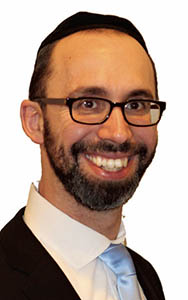
What an emotional scene plays out before us when Yosef is reunited with Binyamin, his long-lost blood brother, whom he has not seen in 22 years. There have been no letters, no pictures…certainly no emails or texts! This was a raw, powerful moment. They hug and they cry together. But Rashi indicates the tears were not of joy, but rather tears of sorrow. The brothers foresaw terrible tragedies that would befall each other in the future. The two Batei Mikdash in Binyamin’s portion of land would be destroyed, and the Mishkan that had its home in Yosef’s portion would be destroyed. (Megilla 16b)
But why should they be crying now about such distant events? And why about these specific tragedies among all those suffered by klal Yisrael?
Rabbi Yechiel Spero tells an incredible story that may help us understand. Rabbi E. had a chesed organization to help marry off poor orphan kallot. One morning, an Israeli kallah who was orphaned at a young age came to see him. She had been raised by her uncle. She had just gotten engaged, but there was no money for the wedding. Rabbi E assured her he would help. Moments later, Shira, another young girl, came in. She relayed how she had a life-threatening tumor. Rabbi E. felt badly for her, but indicated he was not able to provide medical referrals. Shira said to him, “I came here not for your help, but to help someone else. The greatest merit for me would be to help another person.” “Perfect,” said Rabbi E. “In the waiting room is an orphaned girl who is a kallah. She needs $30,000 for a wedding and to set up a basic home.” “Fine,” she said, “I’ll ask my parents.” “No,” replied Rabbi E., “You have to raise it yourself.” Shira agreed. They called in the kallah and Rabbi E. told her, “I have great news for you. This young lady has agreed to raise all the money you need for your wedding, but with one condition: under the chupah, you will daven exclusively for this young lady to have a complete recovery.” The deal was sealed.
During the next few months, Shira raised the money required and more. She took the kallah under her care, taking her to stores to purchase clothes and to set up her home. She also helped her pick out a beautiful gown for the wedding.
The day of the chatuna came, and under the chupah, with tears streaming down her face, the kallah prayed for her new patron to have a complete and speedy recovery. Weeks later, Shira went for more tests and was told the tumor had shrunk. She was tested after another several weeks and, miraculously, the tumor had vanished!
Let’s now revisit the reunion of Yosef and Binyamin. This meeting of Yosef and Binyamin was when the Shevatim were once again united. Rabbi Isaac Bernstein from England comments that the whole descent of Yaakov and his children in Canaan to Egypt was caused by the sale of Yosef because of sinat chinam—baseless hatred. This type of discord among the Jewish people later cause the destruction of the Mishkan, the two Temples and the exile that followed. Therefore, this meeting between Yosef and Binyamin was a truly auspicious time, presenting an opportunity for the unification of the brothers to repair this discord. Sinat chinam is all about being caught up in oneself. To repair this rift, Yosef and Binyamin did not cry over their personal loss. Rather, each cried over the loss that would happen to his brother. This was the exact opposite of baseless hatred.
Binyamin and Yosef were teaching us a way to help rebuild the Beit Hamikdash—true caring for our fellow man. This caring need not result in the miraculous cure of a tumor, but can be put into practice in so many simple ways in our everyday lives. We can be a listening ear to a troubled friend; visit a sick person in the hospital; dance at a chatuna—not for personal enjoyment, but purely to bring joy to the chatan and kallah. We can think outside ourselves…think, feel and be sensitive to the welfare of our fellow man. All these actions will serve as a true foundation for the rebuilding of our next Beit Hamikdash.
By Rabbi Baruch Bodenheim
Rabbi Baruch Bodenheim is the associate rosh yeshiva of Passaic Torah Institute (PTI)/Yeshiva Ner Boruch. PTI has attracted people from all over Northern New Jersey, including Teaneck, Bergenfield, Paramus, Rockaway and Fair Lawn. He initiated and continues to lead a full, multi-level Gemara-learning program in the evenings, gives Halacha and Hashkafa shiurim on Shabbos and, more recently, has spread out beyond PTI to begin a weekly Beis Medrash program with in-depth chavrusa learning in both Livingston and Springfield, New Jersey.













